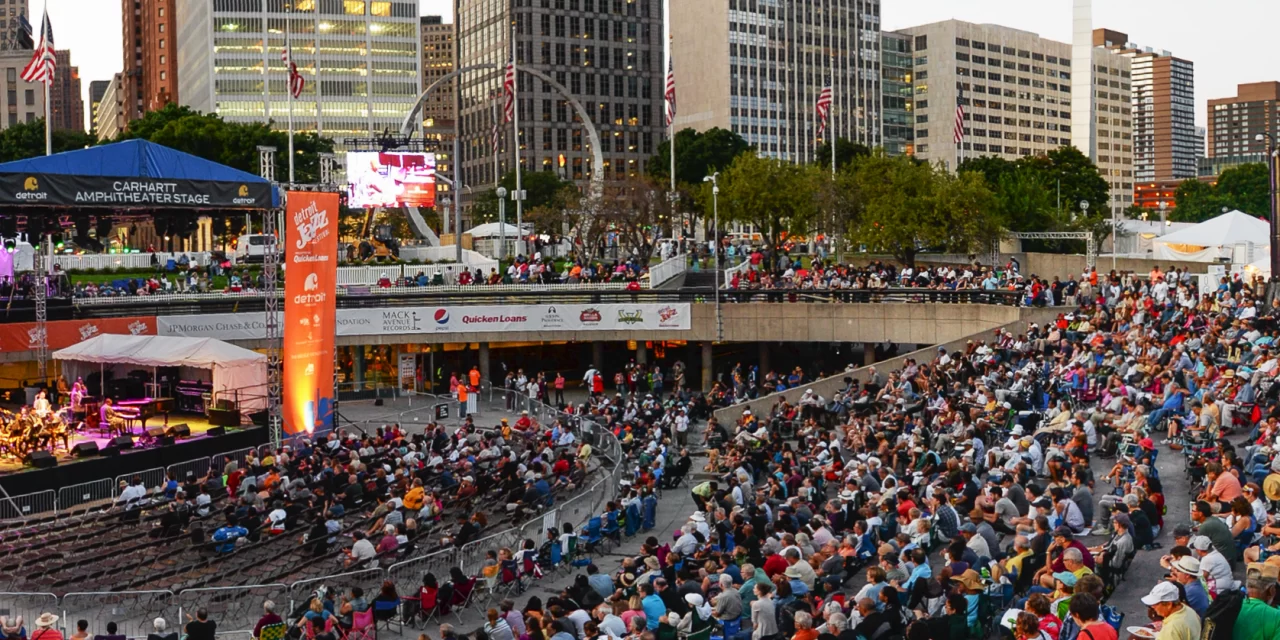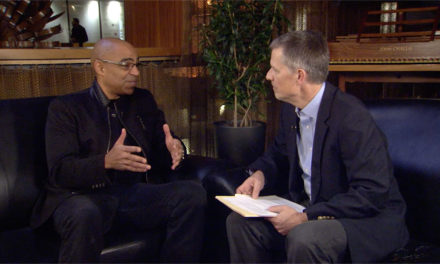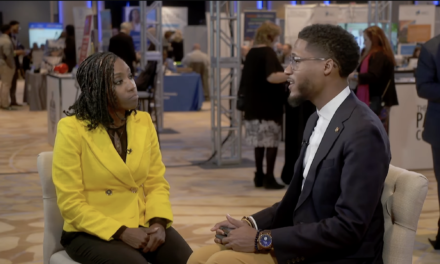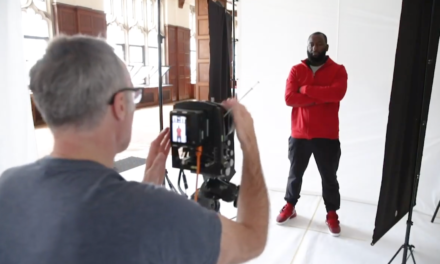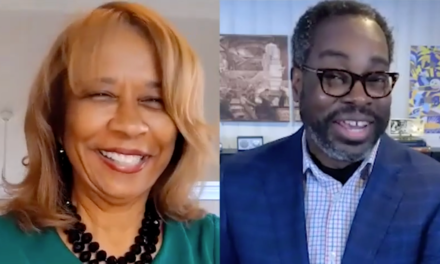This Week on American Black Journal:
Detroit Jazz Festival Returns In Person for 2022 Labor Day Weekend
After two years of virtual performances, Detroit Jazz Festival, the annual Labor Day weekend tradition is planning to return to live, public performances in downtown Detroit for its 43rd festival season.
Host Stephen Henderson gets all the details on this year’s event from Detroit Jazz Festival Foundation President & Artistic Director Chris Collins, including the lineup of performers and the live streaming options available for jazz lovers who can’t make it in person. Plus, Collins unveils the official jazz poster for this year’s festival to “American Black Journal” audiences.
RELATED: View the 2022 Detroit Jazz Festival schedule and lineup here.
Jazz violinist Leslie DeShazor also joins the conversation to talk about her excitement of being a solo artist for the first time at this year’s festival, following years of participating in the string sections for other headliners. And, Central Michigan University’s Executive Director for Detroit Outreach Rhonda Welsh speaks about CMU’s support for the Detroit Jazz Festival’s year-round educational initiatives that are preparing the next generation of musicians.
Plus, we’ll close out the show with a performance by the Leslie DeShazor Quintet, recorded at the Dirty Dog Jazz Cafe in Grosse Pointe Farms.
Watch Now:
Stay Connected:
Subscribe to Detroit Public Television’s YouTube Channel & Don’t miss American Black Journal on Tuesday at 7:30 p.m and Sunday at 9:30 a.m. on Detroit Public TV, WTVS-Channel 56.
Catch the daily conversations on our website, Facebook, Twitter and Instagram @amblackjournal.
View Past Episodes >
Watch American Black Journal on Tuesday at 7:30 p.m. and Sunday at 9:30 a.m. on Detroit Public TV, WTVS-Channel 56.
Full Transcript:
Stephen Henderson, Host, American Black Journal: Chris, I’m going to start with you. What’s new this year at the jazz festival? I go every year. I know lots of people who do. You don’t have to sell me. But what are the, what are the high points this year that people can expect?
Chris Collins, President & Artistic Director Detroit Jazz Festival Foundation: Well, 43 years in and still all jazz and still all free. In fact, one of the beautiful parts we’ve extended this year, lessons learned from ’20 and ’21. We accumulated last year two and a half million viewers in 32 countries around the world and our broadcast-only event. And so we’ve been appealing to them all year round with online programming.
Chris Collins: And this year, in addition to coming in-person, downtown Detroit, the 325,000 thousand or so folks that join us over the four days. We are also offering through our website all four stages live streamed. You can select anything you want to watch to the world for free. So it extends our mission to everyone. Jazz for everyone and jazz free for everyone.
We’ll also be putting that out into the public radio stations, public television and other places that people don’t have wifi. But the point is, it is going to collectively with the people live in person and the people watching online, one of the largest jazz audiences for any jazz event. So be a part of it. That’s what makes it special. In addition to, of course, being one of the great, great, great, well-known global jazz festivals on the planet.
Stephen Henderson: Yeah, I think that’s worth talking a little more about this, this idea that you’re able to reach that many people. This was always a very big festival and there’s lots of people who came downtown for. I mean, you’re able to extend that reach in a way that I couldn’t have imagined just a few years ago. And it’s because you had to. But that’s a good thing. I mean, that’s a great thing, not just for the festival, but for Detroit itself to have us on that big of a stage for this premiere event.
Chris Collins: Well, you put your finger on it. It’s a statement about the tenacity of the jazz festival team, our incredible stage workers. Everyone that does everything that makes it happen and it exports to the world what we do here in Detroit. And we put our backbone into everything. And in fact, in 2020, our first broadcast-only event, pretty much everything else shut down.
But we had this technology in the works for a number of years with our Detroit Jazz Fest Live app. And of course, we didn’t have tickets to rely on, so we produced that festival and we broadcast only on four stages and we had nearly a million viewers. The following year in 2021 when we did it, we were told, Oh, you’re going to compete with the sunshine, won’t be as good.
And I had to have my metrics folks check it three times. We were up to nearly two and a half million by the end of the festival. So let’s learn from that. Let’s keep it high def. for everyone to see and hear whether they come down in person to downtown Detroit or watch it at DetroitJazzFest.org. They can be part of this huge jazz audience that rarely, rarely happens in the world.
And quite frankly, it’s an extension of our mission because we work very hard with our incredible sponsors, including Central Michigan University and our presenting sponsor, the Great Rocket Mortgage again this year Absopure, Carhartt and Comcast, many others to make sure the festival stays free for everyone. So this simply extends it from Detroit around the world. And what a beautiful message it sounds.
Stephen Henderson: Yeah. I’m going to come back to you, Chris, in a little bit. And we’re going to have our annual tradition here on American Black Journal of unveiling the Jazz Fest poster right here. I see it over your shoulder there. I’m kind of getting anxious to know what it is.
Stephen Henderson: But first, I want to talk a little with Rhonda Welsh about Central Michigan’s involvement in this, not just as a sponsor, but as kind of an anchor for the idea of the educational part of this. This is not just a concert. This is not just thinking about how much we love jazz. It’s about making sure that the next generation of jazz musicians gets exposure and opportunity.
Rhonda Welsh, Executive Director of Detroit Outreach, Central Michigan University: Wow. You have just taken the words right out of my mouth. For the last three years and we’ve been involved more than three years, but for the last three years, we’ve been specifically involved with the collegiate combo competition. And that’s exactly what we’re striving to do, is making certain that we’re exposing this music and the culture of the jazz festival to future generations by being a sponsor. That’s how we see it.
We see that we are helping to engage in the vibrancy of this great city and the city of Detroit is so integral to our success as a university. And so it just makes sense for us to support the Jazz Fest for over 40 years. This has been an enduring institution here in our city. And so we are pleased and proud to be a part.
Stephen Henderson: Yeah. Leslie, a little later in the program, we are going to hear a performance that you recorded for us. But first, talk about your involvement with the Jazz Festival, which has gone on for a long time. And tell us what you’re doing this year at the festival.
Leslie DeShazor, Jazz Violinist: I have been fortunate to be a part of the stream section for a lot of the major headliners, which has been really, really fortunate because I remember the years where I didn’t get to participate. I’d be hanging around all the time. I did get to play one year, years ago with Teddy Harris and Donald Walden’s jazz orchestra. But of course, they passed on and that orchestra didn’t continue.
So I would just be kind of like a stage rat just hanging around. But so then Chris started bringing acts in and bringing the orchestra in. And fortunately, I was one of the people who got called. So I think probably the highlight was Roy Hargrove, because I have always been a huge Roy fan. But there are a lot. Wayne Shorter We got rained out. We still had a rehearsal with him, which is really awesome.
So this year, when it was time to submit for artists, I was like, Okay, I’m going to submit. This is my first time submitting because this is the first real year that I’ve actually stepped out as a solo artist. I’ve done a lot of backing, a lot of orchestra playing, a lot of sideman playing. So the pandemic gave me time to finish recording my vision in terms of my record.
And so thankfully, I was accepted as one of the artists to play as a part of the festival. So my band, as Chris mentioned, is a quintet. It’ll be drums, keys, guitar and bass and myself. I’ll play mostly electric five-string violin, which has the range of a violin and viola. I’ll probably also play some viola on that, but it’s a kind of… A unique sound.
And obviously that I’m a string player who is a bandleader but also it has some reminiscence like fusion feeling, a little bit more of like a groove-oriented feel. So I’m excited. This is big for me because I have not really been able to do this and I’ve always wanted to. And this is obviously a huge platform for music and a lot of really dedicated fans. So I’m very, very excited about this.
Stephen Henderson: I love, what I love about your story is that there’s this great arc to it. That you start out doing one thing and then one day you find yourself on stage leading your own, your own ensemble. That’s a really important part of the festival, and it’s one of the things that we’re able, I think, to really celebrate here because the festival is such a powerful institution. Leslie, did you ever imagine, I guess, that it would get to this point?
Leslie DeShazor: I didn’t think it would so quickly because I know people who have been trying to get in the festival for a long time.
Stephen Henderson: And can’t, right?
Leslie DeShazor: And don’t, yeah. I mean, I’m sure there’s so many amazing submissions and so many amazing artists. And I’m sure for the committee whose choosing it’s really hard to narrow it down. I would not want to be in their shoes. I’m sure they get a lot of feedback, maybe something they didn’t want to hear. So it did happen pretty quickly.
But I think that also is due to the fact that I’ve been working here in the city for a long time. I’m not really a spring chicken, but also too, I’m not sure exactly why, but I think having had some legs in the city already does help. But I, I really think that the project is really different and unique. I won’t say how great it is. I’ll let you be the one to decide that, but it is like a dream come true. I always sit at every festival and I’m like, Oh, I want to be.
Stephen Henderson: I want to do that, right?
Leslie DeShazor: Yeah. So this is really great.
Stephen Henderson: Yeah that’s very cool. Okay, Chris, we’re going to come back to you now and talk about the poster for this year. We have our great unveiling.
Chris Collins: Yes, indeed. And I will just say Leslie and Rhonda are such great examples of the kind of community effort that makes this Detroit Jazz Festival so special. And Leslie, there’s no committee. When I came in 11 years ago, I said that the artistic director has to choose the artists. And I listened for great music and then we looked for very special projects. And that’s how the artists find their way to the stage.
So we’re so happy to have you. You have a very special project and I will say it’s great because it is. So she’s on Sunday at 3:45 at the Pyramid Stage on the 4th of September. So with that said, and of course, there’s a million artists we could talk about. Right now, there’s a very special artist and it’s the cat who created the artwork that is the poster for the 2022 Detroit Jazz Festival.
As you know, we go all over the world looking for artists, including our own backyard. We have many Detroit artists have done posters. This year I turned to a collaboration we’ve had in Japan for many, many years with different festivals. And this year with the Tottori Jazz Festival in Japan, an exchange that will result in a collaborative band that will play both in Detroit and in Japan in October.
And there’s a marvelous artist who does sketches and does some amazing work. I just brought one of his books here. You can see these amazing photos. They’re actually wire structures that he creates and then takes photographs out in nature. His name is Koichiro Tokumochi. Koichiro Tokumochi. And not only will he be here, we’ll have a display of many of his works in a gallery we’re going to set up in the Marriott, and he has created the 2022 Detroit Jazz Fest poster. Stephen, do you think it’s time?
Stephen Henderson: I think it’s time. I’m ready.
Chris Collins: All right, let’s do it. The traditional Stephen Henderson, American Black Journal unveiling. Here we go. High tech by the way.
Chris Collins: And here it is.
Stephen Henderson: Oh, look at that. Oh, my goodness. I love it.
Chris Collins: Super, super hip.
Chris Collins: He is, he is quite the sketch artist. All the elements of different instruments and hands, this community vibe that he’s created. But in his sort of avant-garde, free way, which is reflective of the music. I absolutely love it.
Stephen Henderson: Yeah. No, it’s really great. I mean, they’re great every year, right? I’ve never seen one that I’m like, that’s not so good. But this one is particularly noticeable. I mean, that stark contrast between the gold and then that kind of wire, that wire depiction of the figures there is really cool.
Chris Collins: And you will see some of his really large structures and other elements in the display. And by the way, he will be here for the Tottori Detroit Reunion Band, which is playing at the festival and sketching and creating art live to the performance, which you’ll be able to see at DetroitJazzFest.org as it happens on the live stream. So he is going to be very present and someone that you’ll get a chance to meet, an amazingly interesting and thoughtful and visionary individual.
Stephen Henderson: Yeah. That’s really great. So, Chris, tell me about the headliners who people are going to want to come down and see this Labor Day weekend.
Chris Collins: Indeed. Well, we have the great cornerstone of our hometown artists, those global artists that have chosen to live here in Detroit throughout the festival, which we can talk about. But of course, we have to start with our artist in residence, who is the great Chucho Valdes, the godfather of Cuban jazz, will be performing three times throughout the festival and opening the festival with a new piece of his called Creation, which brings together his ensemble with some of the Detroit Orchestra members getting pretty special.
Followed by the Great Soul Rebels just to party into the wee hours on Friday, September 2nd. And then we have quite, quite a mix. I really looked for kind of a new vibe, a new sheen. So while we have the legends, Abdullah Ibrahim is with us, the Lighthouse Project with Dave Liebman is with us and many others. We also have cats like Roosevelt Collier. He’s this jazz steel guitar player with a real aggressive, energetic thing happening.
Donny McCaslin is with us with his new electronic project. Nubya Garcia is with us from London. These are folks that have a completely new perspective on the music, but it’s jazz. It’s jazz inside and out, but it’s a useful perspective. We’ve got Georgia Anne Muldrow, one of my favorite singers coming up. She brings electronica and rap and different elements into her music that makes it really fresh. But still but still, jazz.
Along with Julian Lage, one of the great most recognized young guitar players, and then Bill Frisell, who is one of his mentors, also both playing at the festival. And then we have so many of the well-known artists that people really love to hear coming home to Detroit. Dianne Reeves is with us this year. And Theo Croker, a young trumpet player, playing with seasoned veteran Gary Bartz.
These kinds of things bring something very special along with another cat coming home to Detroit. The great, great, great legend, Charles McPherson is with us this year. These are heavy, heavy cats, along with so many of our Detroit artists, like Leslie. And we have Ralphe Armstrong is playing with his trio, a couple of young cats, Tom Bartelmay Quartet and Sean Perlmutter quartet is coming up doing something special. Mike Dease, the great trombonist, has a wonderful quintet; just a mix of different generations and different vibes, different sounds. A wonderful vocalist named Denise Anissa that you’re going to want to hear. She’s very, very special. So you put it all together, four stages, continuous for four days. A surprise around every corner.
Stephen Henderson: Yeah. And again, free. That always, that always amazes me that you’re able to maintain all of this and it grows over time and it gets bigger and you never say, hey, we’ve got to, we’ve got to start charging a fee. And that’s not the knock the other festivals that have to do that to survive, but it is to celebrate the idea that this is such a powerful draw and institution here in Detroit and there’s so much support for what you’re doing and for preserving it and helping it to grow that you’re able to give all of this to us for free. I can go sit down on the lawn at Campus Martius and just kind of be there all weekend.
Chris Collins: Yeah, you got it. And it does take a community to make that happen. Although we are now looking ten and 20 years down the road where we want to make sure it stays free and it stays jazz for our children and their children. So of course we have our text to give campaign. You can go to DetroitJazzFest.org and make a small or large or lifetime donation.
There’s all sorts of ways to give. And it’s, if you’ve been coming for a while, if you have a little extra this year, be a great time to give so that we can set those foundations for the vision into the future. So this is there for everyone forever and that takes a community.
Stephen Henderson: And Rhonda, I mean, you have a choice really of all the kind of different things you could support in the city of Detroit or festivals. The idea of attaching to this one, which of course is one of the things that helps keep it free. Talk about why the Jazz Fest.
Rhonda Welsh: Well, one of the things that we know is that arts and culture help to build community. It helps to build conversation. It helps to build a narrative about a city. And so because this is such an enduring institution, we really see how this helps to lift up our community. And that’s actually one of our brand pillars that we lift each other up.
Rhonda Welsh: And so we know that by participating in the Detroit Jazz Festival, we hope to lift up our community. And I love what you just said, Chris, about how bringing in some of these new musicians with a different perspective, that helps to ensure the future of jazz. And like I mentioned earlier, one of the things that we want to do is make certain that we’re exposing new generations to this music. And so that’s the why.

